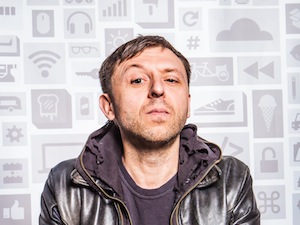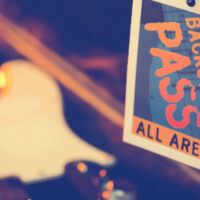Understanding the SXSW Music Festival
This article was first published in January 2014. While some elements are dated, the advice for artists still applies!
James Minor is the General Manager of the SXSW Music Festival in Austin, TX. With over 20 years’ experience in the industry, James got his start as a guitarist playing in a variety of bands and has since been involved in artist management (Voxtrot), booking tours (Explosions in the Sky, Lift To Experience, Her Space Holiday, Telefon Tel Aviv) and tour managing. He has also done talent buying and management for venues including Emo’s in Austin and Rothko in New York City.

I talked to James about how artists and bands can get the most out of attending, networking and performing at large music festivals. He also shared some highlights of SXSW 2014, taking place March 7 – 16.
MC:
Thanks for taking some time to chat, James. So, you got your start in the music business as a musician playing guitar in bands?
JM:
Yes. I played in a bunch of bands, was a band and tour manager and booked tours for other bands and did a little bit of everything before I ended up where I am now.
MC:
And now you’re the General Manager of the SXSW Music Festival. The last time I went was back in 2007. What can folks expect to see there this year that is different from what they’ve seen in years past?
JM:
It’s always a little different, whether we’re planning for changes or not. It’s like trying to steer a big, gigantic ship. Since the last time you were there in 2007, we’ve definitely added more stages, and there are a lot more participating musicians as well as general attendees coming to Austin. We’ve increased the number of stages a little bit this year compared to the last few years, but not significantly.
We’re also growing a lot on the electronic end of the festival. There’s a Dutch Electronic night we’re putting on with a conference called Amsterdam Dance Event. We’re doing all Dutch DJs and producers, which is an exciting new offering for us.
MC:
As a tastemaker, can you point to a specific genre of music that is not yet mainstream but that you think is headed in that direction?
JM:
As far as genres, it’s really hard to say. Nothing is jumping out this year. There are bands you can already tell are going to do well this year, like London Grammar. I’m sure you’ve already heard about them. They’ll get a lot of attention this year. Their press is at critical mass and they’re starting to tour, so it’s really perfect timing for them to play SXSW. They’re even starting to pop up on late night television. They’re a new band, but not a band that doesn’t have a big team behind them.
MC:
My very first year attending was back in 1997, which was quite a different experience. Walking down 6th Street, I felt like every block I would run into someone I knew from the industry. Now it seems to be much more of a party atmosphere – a real celebratory music festival rather than just an industry festival. Was that an intentional direction choice?
JM:
I think it was just something that happened. What has happened with the growth of SXSW is similar to the idea that if you have a certain area of town where artists start to move, the rest follow. There are all these cool, exciting bands performing, and people want to learn about them and see them at the ground level. I feel like we’ve built up a pretty good reputation that way.
MC:
And it’s really grown into something big. What advice would you give to artists going to showcase or network about getting noticed and making sure they are getting the most out of their conference experience?
JM:
First thing is, I think it’s important for artists to take advantage of the conference programming, because there is a lot to learn about the different aspects of the industry. There’s publishing, touring, royalties, sync licensing. We also have recording panels and clinics for musicians. Across the board, there are a lot of opportunities for artists to learn. Even going to see other artists speak about their experiences can be really valuable.
And you mentioned the networking aspect. When you’re networking at an event like this, you never know who you’re standing next to. You’re tripping over other musicians and industry people. I’ve heard stories about people who start talking to a guy next to them at the bar, and it turns out to be somebody of some importance in the business or someone they become great friends with and keep in touch with for years. You just never know who you can run into. I’m sure you have some stories like that.
MC:
I definitely have had both enduring friendships and professional relationships that have come out of every conference I’ve ever been to. I’ve found those experiences really valuable.
But, of course 6th Street is a zoo during SXSW, so meeting and talking to people can be incredibly challenging. Is there anything artists can do beforehand or during to make sure they are really standing out?
JM:
It really depends on where you’re at in your career. I think touring is incredibly important for musicians. Going out and doing the tours when you’re just starting out, where you’re playing in front of 5-20 people, is something you have to do. You learn to appreciate everything a lot more once you get better when you have gone through those types of tours in the beginning. I think that artists doing it for the right reasons are out there to play and perform. Because, if you’re an artist, music has to be something you enjoy and are passionate about. Going out and doing that type of work – the groundwork – where you’re playing in front of 20 people is a chance for you to inspire those 20 people to tell 20 more people. Then, the next time you come to that town, you’ll have a bigger crowd.
Just to offer an example, the band Austra did everything really well. In an earlier incarnation of the band, someone randomly saw them play at SXSW, and they got signed to Domino. The band evolved over the next year and recorded a record, but they did not become well known. Then, they did a couple months of solid touring in the fall. And while there weren’t a lot of people there to see them on that tour, they used the time to really get their act together and get their performance polished. I think that really helped them so that when they got to SXSW, they had an amazing show. They played the Domino showcase, and while nobody knew who they were, they left a real impression. They went back out on tour, their record came out about two months after the festival, and people were excited about it. The sequence of events and the timing ended up working really well for them.
MC:
That’s interesting, because, the way you describe it, someone randomly saw them earlier at SXSW, and then with some heat, they got even better and were able to come back strong.
Is there a certain point an artist or band should be in their career in order to get the most out of the festival?
JM:
We look for artists that already have some momentum and have done the work. The artist should have already played outside their hometown and built up some real interest. Hopefully, the artist already has some press. While it’s not necessary that an artist have a booking agent or a manager, we definitely want to see that the artist is working hard, and that people are responding to the music. Of course, above all, we want the music to be great, be something we believe in and something that fits in with our festival.
MC:
You’ve obviously booked and worked with a lot of bands yourself that have played at SXSW. Can you point to any qualities beyond that x-factor/talent that bands that are successful at the festival have in common with each other? What gets your attention, above and beyond the music itself?
JM:
Of course, there’s no real formula for success, because, if there were, everyone would follow that formula. When we’re reviewing acts, it can be a tossup. Sometimes we’ll get a submission from a random band and will get really excited about it, but it isn’t the right time for them to come. Still, it’s exciting when you find music that speaks to you. We definitely earmark those bands and make a note to check on them during the year to watch how they grow.
If there is a band we think is completely amazing, but they have five friends on Facebook, two songs on SoundCloud and have never really toured or played out live, they would probably come here, play to nobody, and it would be a bad experience for everyone. We’d have an unhappy band and an unhappy venue. Choosing bands to play at SXSW is about finding a band that has achieved a good balance.
MC:
Are there any bands you’re excited for personally?
JM:
I definitely have some personal favorites. For example, there’s a guy named Kirin J Callinan from Australia. He’s on Terrible Records, which is a subsidiary of XL. He is kind of a modern-day David Bowie. He has an amazing voice, is a very inventive guitar player and one of the best performers I’ve ever seen. The record is really bizarre. Some songs are him just singing and playing guitar, and others are avant-pop songs, but they all work, both live and recorded.
There’s also a Swedish band called The Mary Onettes. They fit somewhere between Echo and the Bunnymen and The Cure, with a real ‘80s/’90s feeling.
There’s also the UK indie band Wolf Alice. They are really young – probably just 20-years old. It’s a full band that sounds like PJ Harvey meets Sonic Youth. You can hear that they are still discovering who they are as a group, but they are just so good from song to song.
And there’s also a really great ‘80s-sounding alt pop band playing called Ballet School that I’m excited about seeing.
MC:
It sounds like you book a lot of bands for the festival as a fan.
JM:
Definitely. When you’re really excited about someone’s music, you can’t help it.
MC:
That’s great, because I would imagine if you really liked a band, you could reach out to them and invite them to come play SXSW.
JM:
Yes. And you hope it works out, but it also takes a lot to get here. Travel and lodging costs a lot, so it is expensive for a band to come to SXSW. But, again, we really want to bring music that we believe in and think will do well.
MC:
Do you have any advice for a rookie coming down to SXSW for the first time?
JM:
Don’t over plan. I think it’s really good to go through the guide, figure out what you want to see at the conference and see the bands you want to, but keep it loose. Otherwise, you’ll wear yourself down, because it’s pretty overwhelming.
To learn more about James Minor and the work he’s doing on the SXSW Music Festival, check out the official website – http://sxsw.com









